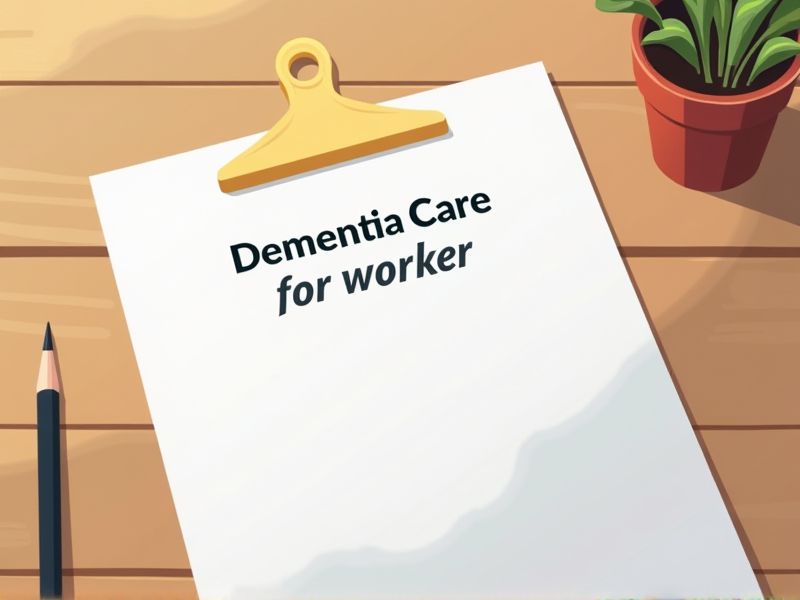
Dementia care requires specialized skills to handle the cognitive, emotional, and physical needs of affected individuals. Certifications ensure that workers possess the knowledge and techniques necessary to deliver high-quality care and ensure patient safety. These credentials enable workers to effectively manage challenging behaviors and improve communication with patients. Important certifications essential for a Dementia Care Worker include the following.
Certified Dementia Practitioner (CDP)
The growing prevalence of dementia increases the demand for skilled dementia care workers, making Certified Dementia Practitioners (CDPs) essential. CDPs have specialized training that improves their ability to provide effective and empathetic care. Residents and families report increased satisfaction and trust in care facilities with certified professionals. Certification helps standardize the quality of care and ensures adherence to best practices in managing dementia symptoms.
Alzheimer's Disease and Dementia Care Specialist Certification
Obtaining an Alzheimer's Disease and Dementia Care Specialist Certification ensures that dementia care workers acquire a comprehensive understanding of this complex condition. This certification provides caregivers with specialized techniques to manage behavioral symptoms effectively, which is crucial for improving patient quality of life. It also helps in fostering communication skills that are essential when interacting with individuals experiencing cognitive decline. Employers prioritize certified caregivers, as they signify a commitment to maintaining high standards in dementia care practices.
Dementia Care Certificate
Dementia care certificates ensure care workers are equipped with specialized knowledge to address the complex needs of individuals with dementia. Proper training reduces the risk of miscommunication and enhances the quality of care provided. Certification increases trust and confidence among patients and their families, leading to better patient outcomes. Employing certified personnel can also mitigate legal and compliance issues, fostering a safer care environment.
Care Certificate in Health and Social Care
The Care Certificate provides dementia care workers with the foundational skills required to understand and respond effectively to the complex needs of individuals with dementia. It ensures that care workers meet consistent standards of care and can deliver quality services. Training through this certification enhances communication skills, crucial for interacting with dementia patients who may have difficulty expressing themselves. It promotes a safer environment by emphasizing the importance of understanding dementia-related behaviors and how to manage them.
Mental Capacity Act Training Certification
Having a Mental Capacity Act Training Certification equips dementia care workers with the knowledge to assess and recognize the decision-making abilities of those in their care. This certification ensures that care workers understand the ethical and legal responsibilities involved in supporting autonomy and protecting rights. It also enables them to implement appropriate interventions when individuals lack the capacity to make certain decisions. Training certification fosters a safer care environment by aligning worker practices with current legislation and best practices.
Safeguarding Adults Certification
Safeguarding Adults Certification ensures dementia care workers understand legal frameworks and procedures to protect vulnerable individuals, leading to enhanced safety. Knowing how to identify and respond to signs of abuse or neglect enables these workers to act effectively in critical situations. Proper training can decrease the likelihood of harm and legal repercussions for both care institutions and employees. Certification demonstrates competence, fostering trust among families and communities relying on dementia care services.
First Aid Certification
Dementia care workers often encounter situations where residents may experience unexpected health emergencies, necessitating first aid certification to ensure prompt response and reduce harm. Legally, many care facilities require staff to have basic first aid training to meet safety and care regulations, so obtaining certification aligns workers with industry standards. Being trained in first aid enables dementia care workers to recognize signs of distress or injury, allowing for timely intervention that can prevent further medical complications. First aid certification provides caregivers with skills and confidence to handle emergencies efficiently, thereby enhancing overall resident safety and well-being.
Infection Prevention and Control Certification
Infection Prevention and Control (IPC) certification for dementia care workers significantly reduces the risk of disease outbreaks in care environments where residents often have compromised immune systems. Proper IPC training ensures that staff are equipped with the knowledge to implement effective hygiene practices, leading to lower incidences of infections. The nature of dementia care requires close and frequent personal interaction, increasing the likelihood of transmission without proper precautions. Certification provides staff with the skills to maintain a safer environment, fostering trust among families and improving overall care quality.
Person-Centered Care Certification
Person-Centered Care Certification is needed for dementia care workers because it ensures that they possess the necessary skills to tailor care strategies according to each individual's unique needs, which enhances patient outcomes. Certification acts as a standardized benchmark, promoting consistency and quality in care delivery among all dementia care providers. Obtaining certification also equips workers with evidence-based practices that reduce the risks of burnout and stress, often associated with caring for individuals with dementia. Having certified staff reassures families and care facilities of the worker's commitment and expertise, fostering trust and peace of mind.
Palliative Care Certification
Palliative care certification equips dementia care workers with specialized skills to manage complex symptoms, enhancing patient comfort. Knowledge in palliative care allows workers to provide holistic support, addressing both physical and emotional needs. Certification ensures that workers stay informed about best practices and new approaches in dementia care. Employers often prioritize certified individuals, recognizing their capability to deliver high-quality patient-centered care.
Summary
When you obtain certifications as a Dementia Care Worker, you'll likely enhance your skills and credibility, leading to improved patient outcomes. This formal recognition often increases your confidence and competence in managing complex cases. Certification can also heighten job satisfaction and career advancement opportunities. Employers and patients typically view certified workers as more reliable and knowledgeable, potentially increasing trust and demand for your services.
